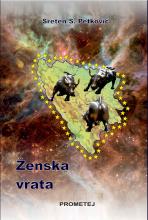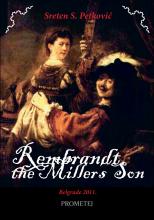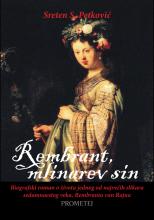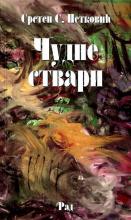A dandelion and carob cake
A story form the novel Rembrandt, the miller's son
Young men think about women the same way non-swimmers think about the sea. They have to jump in and swim; when and how depends much more on others than on themselves. They are posed many questions, but they have no patience to solve them. The word from which they expect an answer is salty and the ear that hopes to get it is thirsty.
Night fell quickly after a short day. The wind was blowing from the sea pushing everything in front like a drunken sailor who cannot find his ship.
I was lying in the mill in my place on the stacked sacks listening to the shadows that the wind wrought as it played with the flame of the lantern.
The door of the mill creaked and opened a bit. Nobody stepped inside, so I thought the wind had opened it. I went over to close it, but all of a sudden a soft and cold hand caught my arm. Jolted in fright, I dragged a girl with me into the mill. She looked like a fairy to me. From under a scarf and a loose black hair shone two beautiful female eyes. Attracted by the sweetness of her look, I came up to her and put my hands on her frozen cheeks. The warmth of my palms must have pleased her, yet her fear made her flinch. She shut the door unawares as she stepped backwards and, frightened, leaned against it.
“Do not be afraid, fairy of the tempest,” I muttered to her, rejoicing in her presence. “It’s warm in here.” I took her to the hearth where Mother had baked bread in the afternoon and where the embers still glimmered in the ashes.
She relaxed a bit and removed the scarf. Her long face, adorned with eyes which dominated it as stars dominate a clear night sky, peered from under a rolled, long black hair. The soft, red lips, perched above a small and pointed chin, just about hid an enigmatic smile. Her thin and elongate nose glimmered in the semi-darkness of the mill. When she took off her coat, I saw her body, slim and slender, quiver by the beat of her heart. Like a doe, caught in a trap, she bucked up, assessing the plight. The beauty of her eyes, the softness of her hands and the tenderness of her body mesmerised me.
My body ached with lust that spilled into a strong desire to embrace her passionately. Yet, I stayed put, wondering what to do. If I hit on, she will take fright and flutter away like a bird. What am I supposed to do now?! She seemed to have notice that I was holding back and that realisation allayed her fear. We looked each other into the eyes. I saw that she liked me and that she, too, was beginning to be carried away by passion. She was quivering and her knees tottered.
Through the play of the shadows wrought by the flames of the lantern, a smile broke out on her lips. I stepped to her. She did not recoil: she was there, waiting for me.
The storm stopped as if to make it possible to touch and lust to entwine. She closed her eyes slowly as if she was inviting me. Our hands glided towards each other and, joining in a passionate touch, went on to caress. Mine held her face, her shoulders and her loins. Hers caressed my hair and clasped in a grip of my neck.
We edged on slowly towards the pile of stacked sacks. She reclined first and I came upon her. Our limbs locked and our bodies, bundles of throb and excitement, demanded intensity. She pulled up her skirt and from between her dancing legs shot her female nakedness. I saw it first time in my life and experienced excitement that would forever be the source of lust and desire from which passion would gush difficult to quash. I felt as if I had tamed the Rhine and embraced the starry skies. At the bottom of the swelling river I found the quiver of the Universe.
We did not even notice that the storm had stopped. The light of the lantern spread evenly. I looked at her eyes wide open and calm like a man who had just regained consciousness. She was incongruously beautiful and unique.
“Who are you, my love?” I asked her ready to take the oath.
“Constance”, she said over the shoulder. “This was your first time. There, I got warm.” She repaired to the door, but came back. “Mother sent me to bring the dandelion and carob cake recipe to the Miller’s wife. Here, it’s written there. And who are you?”
“I am Rembrandt, student of the Latin University in Leiden and her son.”
“For complete love you must have everything: look, touch and time. The joy of that love is like the splendour of the Sun, and the grief for it is death,” said she and went through the door of the mill into the peaceful night.
On the piece of paper, it was written:
The dandelion and carob cake recipe.
Grind leaves of fresh dandelion in a glass of wine, red wine from the bottom of the barrel. Hope chooses the glass and patience fills it.
Pound carob, picked from the highest boughs of the tree, in the mortar and mix it with sweetened flour. Pour wine over the mixture in which dandelion has changed colour into surreal violet and knead it with warm water heated in the morning sun. Knead long until the dough evens out as if ripened in ashes. Bake the cake on the fire burning grapevine and fanned by the rustling salty wind of the northern seas. Eat only at dawn with red wine. It makes possible, it is said, to dream the same dreams many time.
I got to know all answers at once. I licked as man’s dream the salty words containing the knowledge of a young man about the most important question of his life. Hence my tongue turned white as if I had licked fire. I found out what love for a woman is and, mesmerised by it, I sought it all my life.
In the mill, Father learned to pick a sieve by looking at it. He could often sift a thought or a secret before he was said about them.
This morning he entered the mill as if he had dreamed my dreams. He covered me with a coat and whispered into my ear:
“Keep on sleeping, sweet hopes come out of sweet dreams. From now on, you will not dare forget what you have been confided.”






























Add new comment